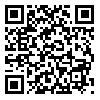Volume 28, Issue 7 (10-2020)
JSSU 2020, 28(7): 2833-2843 |
Back to browse issues page
Download citation:
BibTeX | RIS | EndNote | Medlars | ProCite | Reference Manager | RefWorks
Send citation to:



BibTeX | RIS | EndNote | Medlars | ProCite | Reference Manager | RefWorks
Send citation to:
Safarnezhad A, Peeri M, Azarbayjani M A, Delfan M. Effect of 8 Weeks High Intensity Interval Training on the Gene Expression of BAX and BCL-2 in the Left Ventricle of Diabetic Male Wistar Rats. JSSU 2020; 28 (7) :2833-2843
URL: http://jssu.ssu.ac.ir/article-1-5145-en.html
URL: http://jssu.ssu.ac.ir/article-1-5145-en.html
Abstract: (3114 Views)
Introduction: Regular exercise training with alternating volume fluctuatesblood glucous levels and by regulating signaling in gene expression reduces in myocardial cell apoptosis in diabetic patients. The purpose of this study was the effect of 8 weeks of high intensity interval training on the gene expression of BAX and BCL-2 in the left ventricle of diabetic rats.
Methods: The present study was a quasi-experimental one. 14 male diabetic rats were divided into 2 groups of 7; high intensity interval training (HIIT) and control (C) groups. Diabetes was induced in a pellet with a high-fat diet (30% fat and 25% fructose) for 16 weeks. Twenty-four hours after the last training and recovery session, the rats were sacrificed and their left ventricle was extracted. Glucose oxidase was used to measure glucose in plasma and insulin resistance using HOMA-IR method.. PCR-Real time was used to determine the expression of BAX and BCL-2 genes and the comparison of the groups by Independent T test was performed by Graph pad prism at alpha level of 0/05.
Results: Results showed that, BAX gene expression was significantly decreased in the HIIT group compared to the C group (P=0/0001). BCL-2 gene was significantly increased in the HIIT group compare to the control group (P=0/0001). Insulin resistance index and plasma glucose showed a significant decrease in the training group (P=0/01) (P=0/021). Weight did not change significantly in any of the groups.
Conclusion: Based on the findings, 8 weeks high intensity interval training can be reduced apoptosis in the left ventricle of Diabetic mice by decreasing the BAX gene expression and increacing the BCL-2 in myocardial and might improve diabetes cardiomyopathy.
Methods: The present study was a quasi-experimental one. 14 male diabetic rats were divided into 2 groups of 7; high intensity interval training (HIIT) and control (C) groups. Diabetes was induced in a pellet with a high-fat diet (30% fat and 25% fructose) for 16 weeks. Twenty-four hours after the last training and recovery session, the rats were sacrificed and their left ventricle was extracted. Glucose oxidase was used to measure glucose in plasma and insulin resistance using HOMA-IR method.. PCR-Real time was used to determine the expression of BAX and BCL-2 genes and the comparison of the groups by Independent T test was performed by Graph pad prism at alpha level of 0/05.
Results: Results showed that, BAX gene expression was significantly decreased in the HIIT group compared to the C group (P=0/0001). BCL-2 gene was significantly increased in the HIIT group compare to the control group (P=0/0001). Insulin resistance index and plasma glucose showed a significant decrease in the training group (P=0/01) (P=0/021). Weight did not change significantly in any of the groups.
Conclusion: Based on the findings, 8 weeks high intensity interval training can be reduced apoptosis in the left ventricle of Diabetic mice by decreasing the BAX gene expression and increacing the BCL-2 in myocardial and might improve diabetes cardiomyopathy.
Type of Study: Original article |
Subject:
Exercise Physiology
Received: 2020/05/13 | Accepted: 2020/10/1 | Published: 2020/10/1
Received: 2020/05/13 | Accepted: 2020/10/1 | Published: 2020/10/1
Send email to the article author
| Rights and permissions | |
 |
This work is licensed under a Creative Commons Attribution-NonCommercial 4.0 International License. |







